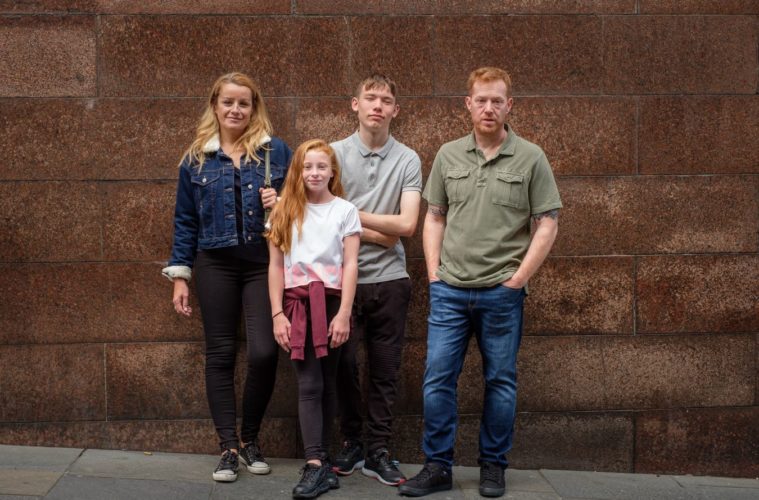Ken Loach’s follow-up to his Palme d’Or-winning I, Daniel Blake is a masterful indictment of the strain of out-of-control capitalism that has dug its heels into post-crash industrialized nations. Sorry We Missed You is, simply, one of his best films that links the personal and the political.
This is Loach’s 14th film in competition at Cannes, where his brand of social realism has found sustained success–he had previously won the Palme for his 2006 Irish civil war drama The Wind that Shakes the Barley. But even at 82 he’s producing some of the richest and most vital work of his career. I, Daniel Blake has an emotional richness, but this is an altogether more focused, more riveting work that lacks its predecessor’s occasional tendency to lurch into holier-than-thou didacticism.
 Rather than focusing on the plight of a single individual, as was the case in his recent social realist dramas like Daniel Blake and Looking for Eric, Loach widens his lens to a family of four, a heightening of emotional stakes in a move that richly pays off through Paul Laverty’s script. Kris Hitchen plays Ricky, whose voiceover opens the movie: he tells his new manager Maloney (Ross Brewster) he’s proud of never having been on unemployment allowance, but has had to work job-to-job, after he lost his construction contract in the global financial crash. The recession also resulted in his family losing a mortgage on their new home, meaning they’ve been shunted from house to house in an unstable rental market.
Rather than focusing on the plight of a single individual, as was the case in his recent social realist dramas like Daniel Blake and Looking for Eric, Loach widens his lens to a family of four, a heightening of emotional stakes in a move that richly pays off through Paul Laverty’s script. Kris Hitchen plays Ricky, whose voiceover opens the movie: he tells his new manager Maloney (Ross Brewster) he’s proud of never having been on unemployment allowance, but has had to work job-to-job, after he lost his construction contract in the global financial crash. The recession also resulted in his family losing a mortgage on their new home, meaning they’ve been shunted from house to house in an unstable rental market.
Now he sees a route out of his family’s predicament of fragile work when he takes a job as a delivery driver. Officially he’s a self-employed contractor–his boss tells him it’s his choice what hours he does: “Like everything around here, it’s your choice,” Maloney suggests, hiding behind nonsense language that has become habitual of today’s working culture: “You don’t work for us… you perform for us, there’s no wages but fees.” In reality Ricky ends up working 14 hours a day for the same company, six days a week under a brutally efficient boss who is proud of his moniker he calls himself: “the patron saint of nasty bastards.”
Meanwhile his wife Abbie (Debbie Honeywood) is another victim of the gig economy, working a “zero-hours” contract as a carer for the health service without formal hours. Their teenage children Seb (Rhys Stone) and Liza Jane (Katie Proctor) are promising students, but barely see their parents. Seb is a artistically minded, but takes his parents’ absence as an excuse to skip school, going off the rails and ending up on the wrong side of the law. His younger sister goes in the opposite direction, taking the role of a guardian, making sure Seb’s awake for school and sending her exhausted parents to bed. She becomes something of the conscience of the movie, and a phenomenal scene sees her in tears after she takes matters into her own hands. Loach’s knack of finding relative unknowns to lead his movies hits another jackpot here–all four in this family are outstanding.
This is a film about the eradication of workers’ rights in the post-crash age (“What happened to the eight-hour day?” a desperate Abbie says), but it’s most potent at showing how as a society, citizens have been able to accept these demonstrable volatile working conditions in the first place. This is a film about guilt, and its vicious role in making those who are in positions of unpredictable work consider whatever given to them as acceptable. Ricky may believe he has the weight of his family on his shoulders, but it’s his wife and kids who want him to slow down hours as he starts to become more and more sucked into the culture of precarious work. Instead, there’s a despairing guilt that Ricky takes on himself that convinces him that his increasingly awful conditions are his only option.
Like all of Laverty’s screenplays, this is a meticulously researched work, and it raises the point that the conditions of Ricky and Abbie are legal, instigated by politicians whom voters have consistently supported into power. And its those people in power at whom this film is surely directed. The genius here is there are no bad people; instead it’s the regime that is unforgiving.
Sorry We Missed You premiered at Cannes Film Festival.

